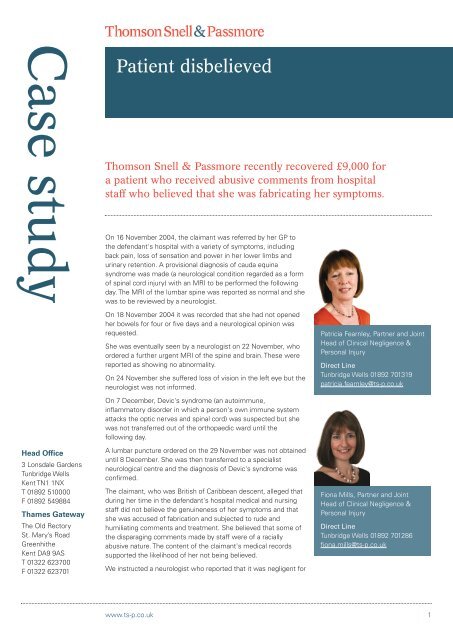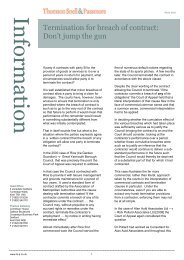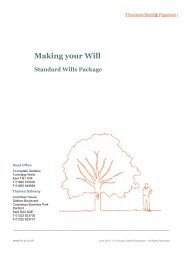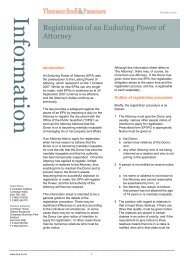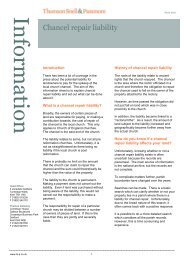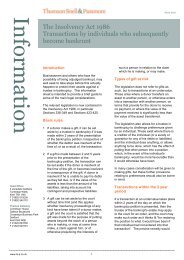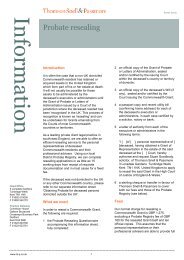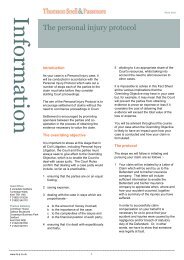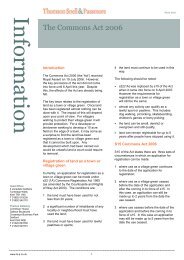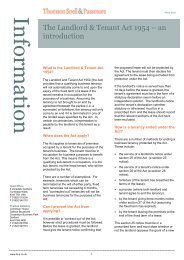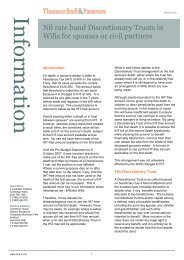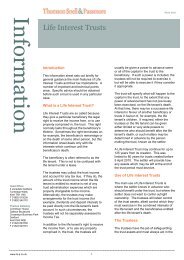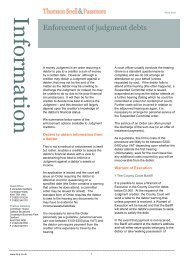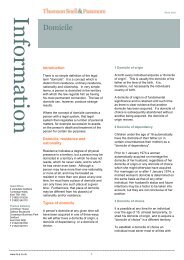Patient disbelieved - Thomson Snell and Passmore
Patient disbelieved - Thomson Snell and Passmore
Patient disbelieved - Thomson Snell and Passmore
You also want an ePaper? Increase the reach of your titles
YUMPU automatically turns print PDFs into web optimized ePapers that Google loves.
Case study<strong>Patient</strong> <strong>disbelieved</strong><strong>Thomson</strong> <strong>Snell</strong> & <strong>Passmore</strong> recently recovered £9,000 fora patient who received abusive comments from hospitalstaff who believed that she was fabricating her symptoms.On 16 November 2004, the claimant was referred by her GP tothe defendant's hospital with a variety of symptoms, includingback pain, loss of sensation <strong>and</strong> power in her lower limbs <strong>and</strong>urinary retention. A provisional diagnosis of cauda equinasyndrome was made (a neurological condition regarded as a formof spinal cord injury) with an MRI to be performed the followingday. The MRI of the lumbar spine was reported as normal <strong>and</strong> shewas to be reviewed by a neurologist.On 18 November 2004 it was recorded that she had not openedher bowels for four or five days <strong>and</strong> a neurological opinion wasrequested.She was eventually seen by a neurologist on 22 November, whoordered a further urgent MRI of the spine <strong>and</strong> brain. These werereported as showing no abnormality.On 24 November she suffered loss of vision in the left eye but theneurologist was not informed.Patricia Fearnley, Partner <strong>and</strong> JointHead of Clinical Negligence &Personal InjuryDirect LineTunbridge Wells 01892 701319patricia.fearnley@ts-p.co.ukHead Office3 Lonsdale GardensTunbridge WellsKent TN1 1NXT 01892 510000F 01892 549884Thames GatewayThe Old RectorySt. Mary’s RoadGreenhitheKent DA9 9AST 01322 623700F 01322 623701On 7 December, Devic's syndrome (an autoimmune,inflammatory disorder in which a person's own immune systemattacks the optic nerves <strong>and</strong> spinal cord) was suspected but shewas not transferred out of the orthopaedic ward until thefollowing day.A lumbar puncture ordered on the 29 November was not obtaineduntil 8 December. She was then transferred to a specialistneurological centre <strong>and</strong> the diagnosis of Devic's syndrome wasconfirmed.The claimant, who was British of Caribbean descent, alleged thatduring her time in the defendant's hospital medical <strong>and</strong> nursingstaff did not believe the genuineness of her symptoms <strong>and</strong> thatshe was accused of fabrication <strong>and</strong> subjected to rude <strong>and</strong>humiliating comments <strong>and</strong> treatment. She believed that some ofthe disparaging comments made by staff were of a raciallyabusive nature. The content of the claimant's medical recordssupported the likelihood of her not being believed.We instructed a neurologist who reported that it was negligent forFiona Mills, Partner <strong>and</strong> JointHead of Clinical Negligence &Personal InjuryDirect LineTunbridge Wells 01892 701286fiona.mills@ts-p.co.ukwww.ts-p.co.uk 1
<strong>Patient</strong> <strong>disbelieved</strong>Continued...the defendant to have treated the claimant on a orthopaedic ward<strong>and</strong> not to immediately refer her for neurological opinion <strong>and</strong>there was a further unacceptable delay in carrying out an MRIscan of her brain. However, in view of the claimant's strongrecovery, that delay had not caused any organic injury.Nonetheless, the claimant had known that there was a delay indiagnosis <strong>and</strong> thought that this had prejudiced her subsequenttreatment. We instructed a psychiatrist, who reported that shewould probably have suffered depression in any event, but thather treatment at the hospital had aggravated these injuries....staff did not believe thegenuineness of her symptoms<strong>and</strong> she was accused offabrication <strong>and</strong> subjected torude <strong>and</strong> humiliating comments<strong>and</strong> treatment.We wrote a letter of claim <strong>and</strong> simultaneously made a formaloffer of settlement of £10,000, supported by the psychiatrist'sreport. A short while later, the case was settled by negotiation for£9,000.Fortunately this was an extremely rare occurrence <strong>and</strong>, the onlyoccasion we have known a patient believe that they had beentreated with racist overtones. Apart from that, one must havesome sympathy for the treating staff. It is well recognised thatsome patients exaggerate their symptoms. This may be donequite innocently as a device for persuading the doctor of theseriousness of the patient's condition. At its most extrememanifestation, we have come across several cases of suspectedMunchhausen's by proxy, whereby one party (often a parent)inflicts deliberate harm on another with a view to attractingattention.We have recently dealt with a case where it is believed that achild was catastrophically injured as a result of such an assault bya parent after paediatric staff failed to act on their suspicions ofMunchausen's. The police subsequently prosecuted the parent.These cases illustrate that both excessive scepticism <strong>and</strong>insufficient caution can lead to tragic consequences.www.ts-p.co.uk 2


